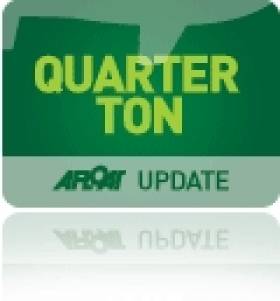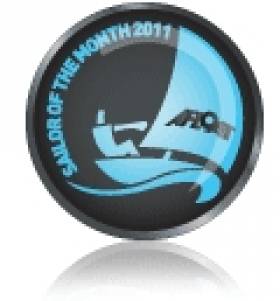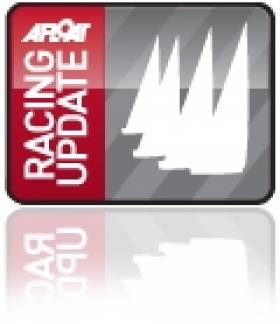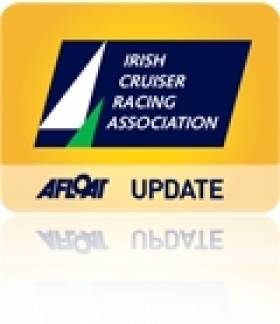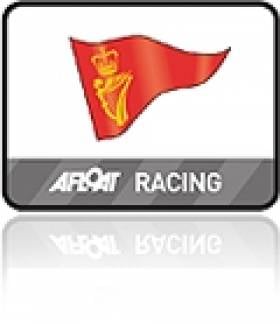Displaying items by tag: Tiger
Royal Cork's Tiger Attacks at Cowes Quarter Ton Cup 2012
#quartertoncup – In the all amateur Corinthian Division of the Quarter Ton Cup in Cowes the defending champion Tiger and her young crew led by George Kenefick from Royal Cork (ably assisted by Mike Budd), leads the fleet with five first places and a black flag. The battle for second is tied between Paul Kelsey's Runaway Bus and Richard and Anna Thomas's Sergeant Pepper, both stalwarts of the Coutts Quarter Ton Cup, who each count eleven points, putting them six points behind Tiger. Eric William's delightful little Love In A Mist, the smallest boat in the fleet is fourth with Dun Laoghaire's Ken Lawless & Sybil McCormack's Supernova fifth. Royal Irish club mate Paul Colton's Cri-Cri is sixth and Lucy Wood and Tara Stone's Rum Bleu seventh.
Whilst the weather may have been overcast on day two of the Coutts Quarter Ton Cup the fleet most definitely was not and the 30 teams enjoyed three more stunning races. It was a day of high drama in every sense with constant parry and thrust on the race course and the black flagging of four of the top ten boats in race six. With the discard not coming into play until a seventh race has been sailed the black flags hit the overall results hard. Those affected were Rickard Melander's Alice II, Rob Gray's Blackfun, George Kenefick's Tiger and Louise Morton's Espada, all of whom are ranked in the top ten.
The Irish teams had another great day with Ian Travers and Eamon Rohan's Per Elisa and Diamund Foley's Anchor Challenge, being helmed this week by Paul Gibbons, both putting in solid results. Per Elisa won race four, stumbled with a fourteenth in race five but came back with a fifth in race sixth to move up from ninth overall to fifth. Anchor Challenge struggled in the first race finishing twenty-first but then won races 5 and 6 which shunts them from fifth to third overall, six points behind Aguila.
George Kenefick is October's Sailor of the Month
The 23-year-old helmsman won the Quarter Ton Classics Corinthian Division in July with his immaculately-restored boat Tiger, racing against a top lineup in the Solent. That performance saw him recruited to helm the English-owned boat Chimp in the Half Ton Worlds at the same venue in August. Kenefick showed the quality of his abilities by interacting with a crew he'd never sailed with before to become overall winner against an impressive international fleet.
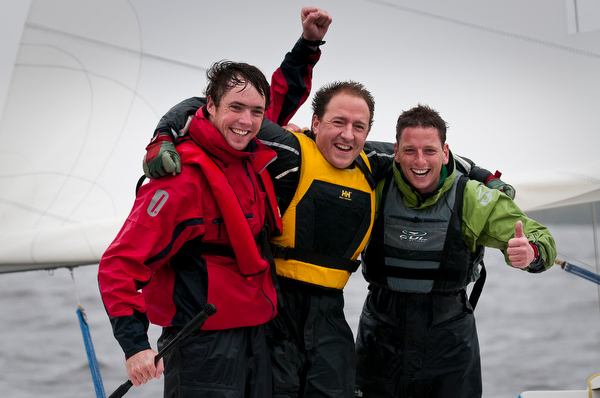
George Kenefick, Mel Collins and John Downey celebrate their win on Lough Derg. Photo: Brendan Fogarty
Back in home waters, next up was the Waterways Ireland ISA National Championship on Lough Derg in the ISA's SailFleet flotilla of J/80s at the beginning of October. For this series Kenefick recruited Crosshaven clubmates John Downey and Mel Collins as crew. The opposition included former champion Mark Mansfield, who had returned to competitive sailing by winning the 1720 Europeans in Baltimore against a fleet including Anthony and Nicholas O'Leary, both former Irish Open Champions.
It went right down to the wire, with Mansfield and O'Leary emerging well ahead on 12–points apiece. On the countback, Kenefick was the new champion. Almost immediately, he was back in the thick of logistics and personnel organization in taking the Cork Institute of Technology sailing team to France for the Student Worlds, CIT representing Ireland as winners of our national series.
With sixteen college teams from all over the world, even in resources-rich French sailing the organizers were stretched in finding an evenly-matched fleet of sixteen Archambault keelboats. There were top class new boats, but some not so new boats, and a trio of boats well past their sell-by date. It was all in the luck of the draw, and the Irish and much-fancied Portuguese found themselves drawing the shortest straw.
In a demanding series, the Portuguese were never at the races with their tired mount, but the Irish simply refused to give up despite a boat which, with its equipment, was falling apart. There was ample opportunity to do this, as the series in the Bay of Biscay off La Trinite included some really rough stuff. In fact, the Irish revelled in the strong breeze, but in the light airs which settled in as the week drew on, it took pure skill.
By the final races last Saturday, they'd got themselves an unassailable third position, but the two British teams – defending champions are allowed an extra place – had miscalculated the points situation. So on the final day, they team raced, one of their boats sailing the Irish crew down the fleet in the best Ben Ainslie style. It was the first time Ireland had finished outside the top six, but they still had the bronze, the Brits took silver, and the French were well ahead to win overall.
More from WM Nixon in the Irish Independent here
Kenefick's Tiger Fourth at Cowes Quarter Ton Cup
With two races completed at the end of Day 1, only 7 points separate the top 6 teams at the Coutts Quarter Ton Cup . Rob Gray's 'Aquila' holds the overall lead with a total five points, tied with Louise Morton's 'Espada' in second. Rounding out the top three just one point adrift of 'Espada' is Rickard Melander's 'Alice II', who holds a 4 point advantage over Cork's George Kenefick's fourth placed 'Tiger'. Fifth at the end of Day 1 is 'Cote' owned by Darren Marston & Ollie Ophaus.
Day 1 of the Cup dawned bright and clear but with an almost total absence of the most necessary ingredient for a sailing regatta - wind. With the glassy conditions meaning that there was very little chance of racing getting away at the scheduled 10.30 start time, Principal Race Officer Robert Lamb sensibly held the fleet ashore whilst he and his race team headed off onto the Solent in search of some sort of usable pressure. Having persevered in their quest for some several hours, Lamb and his team were eventually rewarded for their patience at around 14.00, when a pleasant 10 knot south westerly breeze materialised, enabling the eager fleet to finally put to sea for what turned out to be two excellent and closely fought races.

Tiger - Lying fourth in Cowes. Photo: Bob Bateman
Despite the wide range of sizes and designs making up the 30 boat fleet, the racing could hardly have been closer both on the water and on handicap, with every startline and mark rounding fiercely contested throughout the day. In Race 1, Louise Morton's 'Espada', (helmed at this event by Colette Blair standing in for the injured Morton) turned in a line honours performance in the first race, which was good enough to also give 'Espada' a corrected time race win by just under a minute. Second in that race was last year's Quarter Ton Cup winner 'Cote' owned by Darren Marston & Ollie Ophaus, who edged Sweden's Rickard Melander on 'Alice II' into third place by just 16 seconds on corrected time. Fourth was Rob Gray's 'Aguila', ahead of Ireland's Eamonn Rohan on Anchor Challenge.
Race 2 saw a compelling three-way battle for line honours between 'Aguila', 'Alice II' and George Kenefick's Irish entry 'Tiger'. 'Aguila' eventually prevailed to take the gun and a narrow 8 second corrected time victory over 'Tiger' in second and 'Alice II' in third. 'Espada' rounded out a solid day with a fourth place ahead of Ian Southworth's 'Whiskers'.
With two races completed at the end of Day 1, only 7 points separate the top 6 teams. Rob Gray's 'Aquila' holds the overall lead with a total five points, tied with Louise Morton's 'Espada' in second. Rounding out the top three just one point adrift of 'Espada' is Rickard Melander's 'Alice II', who holds a 4 point advantage over George Kenefick's fourth placed 'Tiger'. Fifth at the end of Day 1 is 'Cote' owned by Darren Marston & Ollie Ophaus.
As the fleet returned to the dock this evening, the smiles on the faces of the sailors was a clear indication of a fun day of Quarter Tonner racing. Having travelled from Russia to compete in Cowes this week with his French Quarter Tonner 'Bullit', Dmitry Borodin said that he had thoroughly enjoyed his first experience of racing in England. "To have the chance to sail here in Cowes is a real pleasure. There are so many fantastic boats and just being here in a town with this sort of sailing heritage is fantastic. On the water I think we have much to learn but we are enjoying our first Quarter Ton Cup and we will take the message back home with us. Hopefully in years to come there will be more Russian boats coming to sail in this regatta."
Colette Blair from 'Espada' declared herself happy with her team's first day performance. "We are fortunate that Espada performs well in all conditions, but today we seemed to be going well and we are pleased with the way we sailed." Blair also commented that Espada's only non-female crew member, mainsheet trimmer Stuart Childerley, had coped well with being the only man on-board. "It's great to sail with Stuart although I think he found the general conversation onboard today rather different to what he is used to."
Anchor Challenge's Eamonn Rohan, a first timer at the Quarter Ton Cup, had also clearly enjoyed his day on the water but was quick to pay tribute to the quality of the fleet. "This is the toughest Quarter Ton racing that we have done since we bought the boat. There are so many really fast boats and competitive crews sailing here this week, it's been a bit of an eye opener. We are having fun though and looking forward to tomorrow's racing."Despite lying in last place overall Richard Johnson & Sarah Lyle on 'Hannah J' were still amongst the most enthusiastic owners checking the results in the clubhouse after racing. "We had a great day out on the water and we are really pleased not to have finished last in the second race! Can you tell this is our first time? What we are really hoping for is an overall wooden spoon prize!" commented Sarah.
Racing at the 2011 Quarter Ton Cup continues tomorrow Tuesday 12 July with three more races scheduled. The regatta concludes on Wednesday 13 July.Cruiser Racers Head for Royal Cork
Simon McGibney of WIORA confirmed there are already at least 15 boats interested in travelling to the event to join with the Cork, Kinsale and East coast boats. There is also the tantalising prospect of the fleet being joined by no less than ten quarter tonners from the UK who also plan to sail in the Sovereign's Cup at Kinsale the following week. Most of these British boats are crewed by professionals and will race with the Irish Class three fleet. They will, however, be scored separately and will receive a separate trophy.
Sailing with the Quarter Ton fleet will be Anchor Challenge, beautifully restored and modified by former owner Peter Morton, and now in the ownership of Eamon Rohan. At the weekend our spy spotted an all white gleaming boat wending its way up the Kinsale Road and wondered could this possibly have been Anchor Challenge and, if so, will we see a battle between the all black Tiger and the all white newcomer??
For the duration of the ICRA National Championships there will be subsidised launching at Ringaskiddy for all trailerable boats. In addition a very attractive accommodation package has been arranged for all ICRA competitors at the Carrigaline Court Hotel. They are offering three nights B/B plus one evening dinner from Thursday to Saturday and free B/B for Sunday night at €129 per person sharing.
A crew list has been set up by RCYC for skippers wishing to acquire crews with local knowledge and Race Officers for the event will be the hugely experienced Peter Crowley and Richard Leonard.
ICRA Commodore Barry Rose was delighted to inform the meeting that Yacht Designer Mark Mills has joined the ICRA committee where his expertise and wide knowledge will be greatly appreciated. Mark gave a most interesting report on recent developments re racing matters. One item referred to the fact that boats with bulb keels will now be more severely rated and another item of interest is discussion going on with regard to changing the rating bands for the 2012 Commodores Cup. It is believed there is a move afoot to lower the bands i.e. the current middle rated boat may be the big boat for the 2012 event.
Tiger Leads Class III in Royal Cork October League (PHOTOS HERE)
What a day this Sunday's racing turned out to be. From the moment one turned the corner on to the Crosshaven road at Carrigaline there was magic in the air writes Claire Bateman. The sun was shining, the trees were resplendent in their multi colour seasonal changes and the line of cars making their way to the Royal Cork Yacht Club was non-stop. The forecast said Sunday was going to be a very nice day with lots of sunshine but nowhere did I hear anyone say anything other than winds would be light and, so it seemed, until a flag outside one of the supermarkets on the road to Carrigaline seemed to be moving pretty nicely and was a taste of things to come.
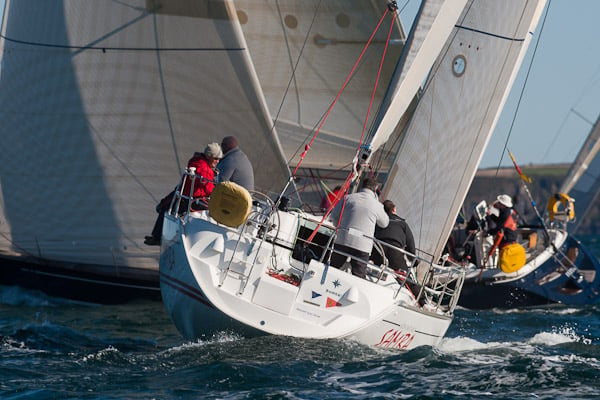
Tight racing in the penultimate race of Royal Cork's October League. Photo: Bob Bateman. Scroll down for more photos from yesterday
Classes Zero, One and 1720s got the nicest wind on the laid course to day. Race Officer Richard Leonard and his race committee in Capta Ventum, kindly provided by Pascal Healy, certainly made the best of the day. Today Richard decided on a change of format and started the 1720s first followed by Classes Zero and One together and then Class Two. He gave the fleets short courses providing very tight racing ensuring the crews had plenty of hard work and also providing very exciting viewing with a few heart-stopping moments. The 1720s, Zero and One did three rounds and Class Two did two rounds. With a northerly breeze of some 10 knots gusting to 12 and occasionally 14, it was to provide a tantalising taste of what was to come and there was no disappointment. Voices that hadn't needed to be raised at marks on previous Sundays found the necessity to make themselves heard today and the action was fascinating with hard work on the boats but a sense of great sailing exhilaration emanating from them.
Coming into race two of the day the skippers and crews had got the bit well between their teeth and were all like bucking broncos at the start line. In Class Zero there was an individual recall sounded. Jump Juice and Freya answered the call immediately and returned to restart and after some little while Gloves Off returned and while not knowing the reason why, one can only assume the helmsman perhaps was not quite convinced he had been over but then decided to return having considered it. Again the wind duly obliged and as in the first race, there were boats to the left, boats to the right and boats pretty well everywhere one looked. In Class Zero Tom Roche's Meridian from Kinsale had been performing extremely well but was slightly under
crewed today and was unlucky enough to have an incident at the weather mark in this race and after that things just did not go their way and they retired. This must have been disappointing as they had been doing so well. With Jump Juice winning the first race today and Gloves Off taking the second race and first overall to date in the series, the last day of racing next Saturday will be crucial as these races will be non discardable.
Race Officer Anthony O'Leary stood in to day for David O'Brien and the committee boat Sabrone was again kindly provided by Admiral Paddy McGlade. It was not such a lucky day wind wise inside the harbour for Classes Three and Four and White Sail 1 and 2. There was also extremely low water to day
and some of the skippers mentioned they had in fact touched rocks. Nonetheless they enjoyed good racing if at a somewhat lower pace than the competitors on the laid course.
At this point in time Class Three IRC looks like a two horse race with Tiger on 9pts followed by Bandit on 11pts. Class Four has a very similar situation with Sundancer on 9pts followed by Granny knot on 11pts. In White Sail 1 IRC Minx 111 had a good day to day with a first and second and currently has 7pts overall and the two big boats in the fleet Chancer from Kinsale and Aisha from RCYC are on 14pts each. In White Sail 2 IRC Plumbat is on 6pts overall with Phaeton on 9pts and Silk Breeze on 12pts.
And so we are coming to the final race of this exciting series. All competitors should note carefully that racing will take place on SATURDAY NEXT OCTOBER 30TH. The prize giving dinner will take place that evening at the Club House .
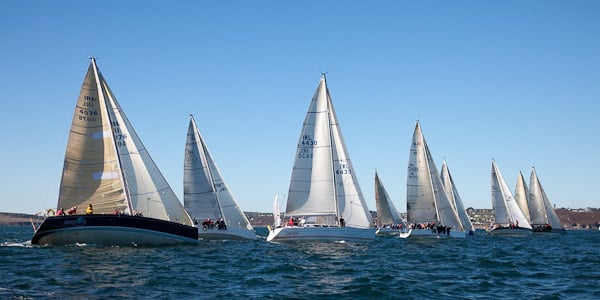
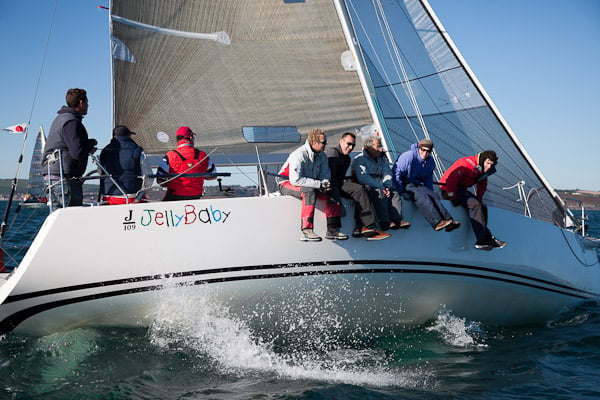
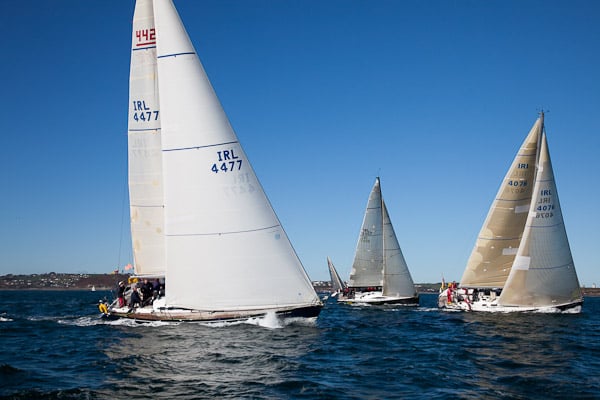
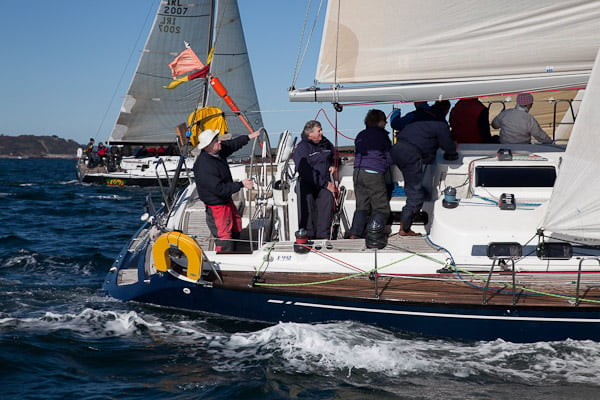
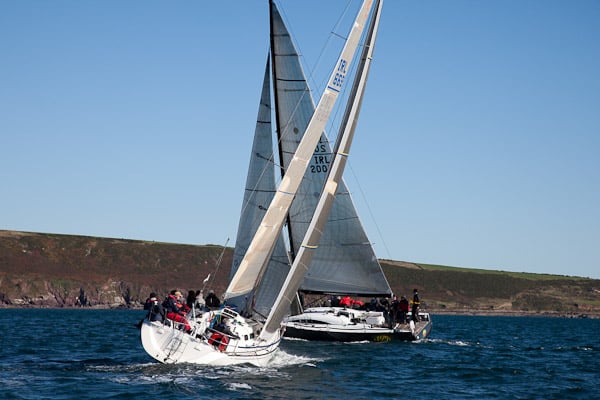
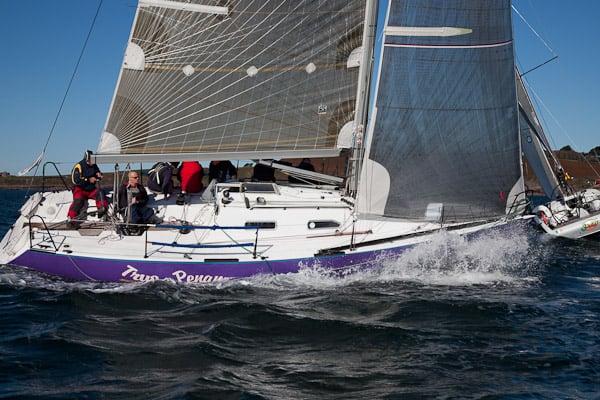
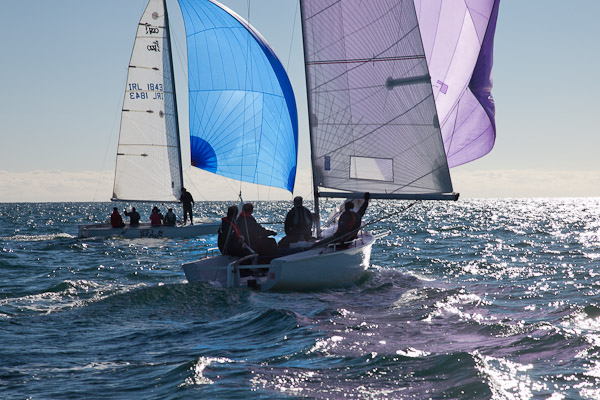
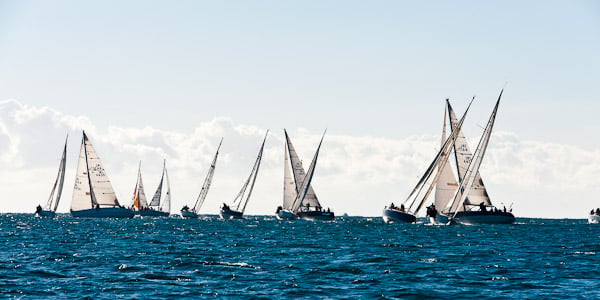
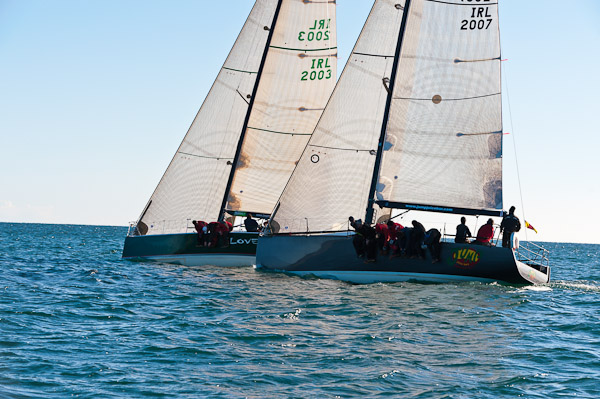
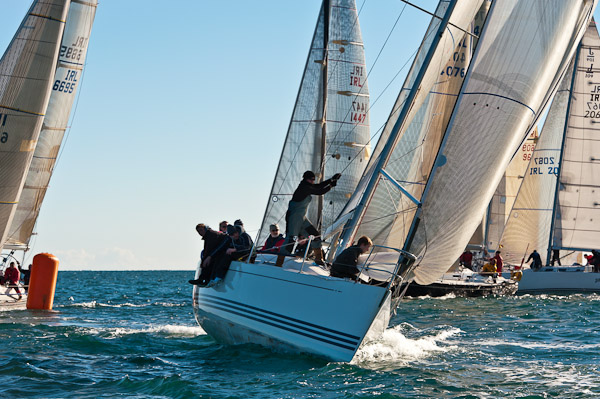
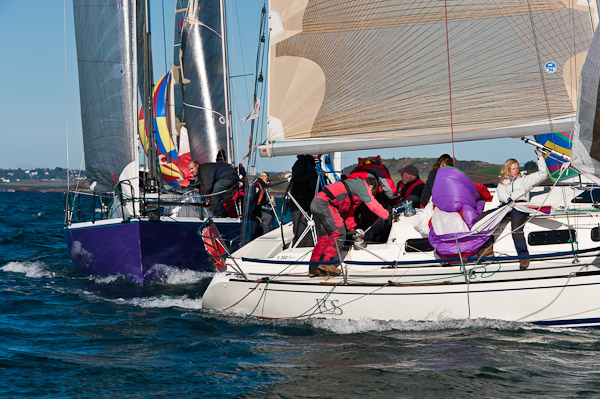
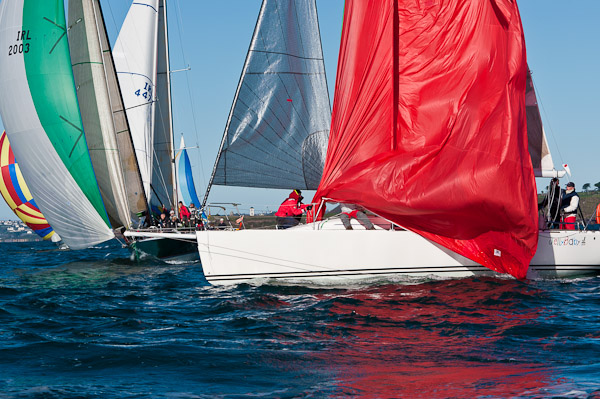
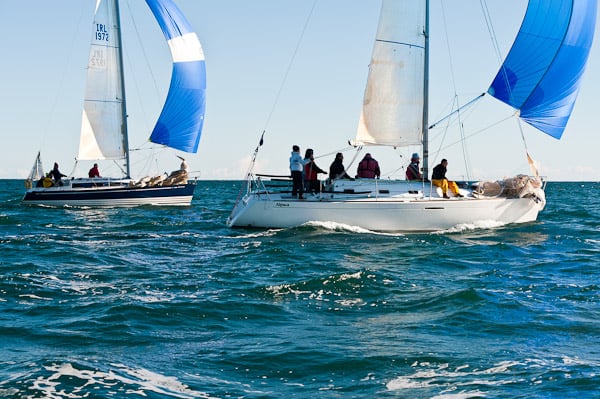
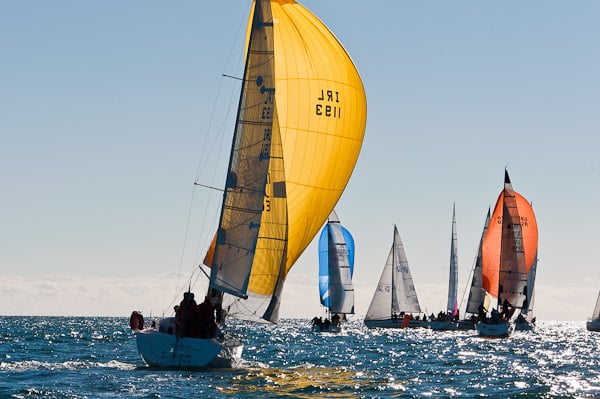
MORE OCTOBER LEAGUE GALLERY IMAGES HERE
Tiger and Super Nova to Contest UK Quarter Ton Cup
Two boats are travelling from Ireland to take part in the UK's Coutts Quarter Ton Cup hosted by the Royal Corinthian Yacht Club, Cowes, from Monday 14 to Wednesday 16 June 2010. The event is expected to attract a record entry along with some exciting new members of the fleet. Boats will be based in Cowes Yacht Haven for the event, writes Fiona Brown.
Having got a first taste of the fleet aboard his father Neil's Manzanita last year, young George Kenefick will be back again sailing the Kenefick family's newly purchased ASAP know known as TIGER.
This stunning all black 1989 Fauroux design has achieved some great results on the UK circuit for the past two seasons and with the very talented George at the helm plus a crew that includes some of Corks finest young sailors including George Kingston, a Laser European champion, and Donagh Good a Laser Junior National Champion,we can certainly look forward to a good performance from this team.
Tiger has just returned from the Liebherr Cruiser Nationals in Dublin and succesfully won Class 3.
They have begun training for the event and if you look out on Cork harbour this week you will be able to see this immacuately re-stored Quarter tonner.
Also making the trip across the Irish Sea, this time from Dublin, will be Ken Lawless who purchased the immaculately restored Super Nova from Ollie Ophaus and who is looking forward to his first Quarter Ton Cup and just recently finished in third overall in the Liebherr Cruiser Nationals.
For the fifth year running the organisers are delighted to be partnering with Coutts & Co, the UK private banking arm of the Royal Bank of Scotland.
For further information, Notice of Race and Entry Form for the 2010 Coutts Quarter Ton Cup please visit: www.rcyc.co.uk
Keep up to date with Tigers progress on facebook.



























